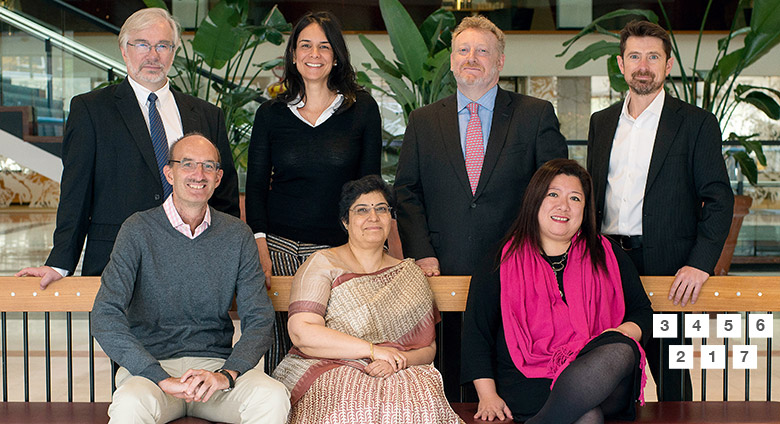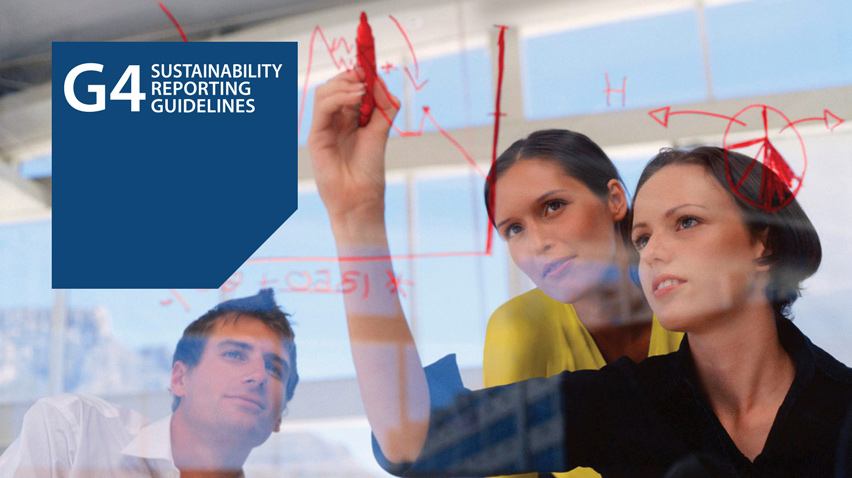External Review Committee
In 2005, Shell established an External Review Committee (ERC) to help evaluate the quality and credibility of the annual sustainability report and to recommend improvements to our sustainability performance.

External Review Committee: (clockwise from centre front)
1. Seema Arora (Chair), Executive Director, Confederation of Indian Industry, India
2. John Gardner, Vice President and Chief Sustainability Officer, Novelis Inc, UK
3. Reidar Kvam, Global Lead, Social sustainability and standards, World Bank, Norway
4. Lavinia Hollanda, Head of Research, FGV Energia, Brazil
5. Mark Brownstein, Vice President, Climate and Energy Program, Environmental Defense Fund, USA
6. Ed Whittingham, Executive Director, Pembina Institute, Canada
7. Bernice Lee, Head of Climate Change and Resource Security Initiatives, World Economic Forum, Hong Kong
Members of the ERC come from a range of professional backgrounds, but they share the following expertise and experience:
- globally respected, independent, pragmatic in their approach;
- familiar with, and able to convey, the perspectives of Shell stakeholder groups or are experts in the main sustainability challenges that Shell faces;
- broadly representative of regions of strategic importance to Shell;
- reasonably familiar with the oil and gas industry, Shell, and related sustainability issues; and
- capable of adding fresh perspectives to Shell’s thinking and reporting on sustainability.
Committee members are asked to serve for three years, with two or three new members appointed each year. This is long enough to develop the necessary understanding of the issues and process, without diminishing the independence or external perception of independence critical to the ERC’s effectiveness. The intention is that the Committee should bring a balance of experience and perspectives.
ERC recommendations in 2014
Each year, the ERC is asked to present its independent opinion on the Shell sustainability report. Below is an example of some of the recommendations included in the ERC’s letter in the Shell Sustainability Report 2014 and Shell’s response. The ERC recommendations have been fundamental in shaping this current report. (See table).
Review process
The Committee meets in person three times annually (in The Hague, the Netherlands), and on other occasions by teleconference. It holds meetings with Shell senior management, including Shell’s Executive Committee, to discuss Shell’s approach to sustainability and our reporting. When reviewing the sustainability report, the ERC focuses on three main questions:
- Has Shell selected the most important topics for the report?
- How well has the report dealt with these topics and responded to stakeholder interests?
- Has Shell provided sufficient information and access for the ERC to do its job effectively?
This review does not include the verification of performance data in the sustainability report, or the information on which the case studies in the report are based. Separately, the ERC provides Shell with its observations on the company’s strategy and sustainability performance.
To acknowledge the ERC’s time and expertise an honorarium is offered, payable either to the individual members, their organisation or their charity of choice. They are also offered reimbursement for their expenses.
ERC recommendations and our responses
ERC recommendation in 2014
The ERC would like to see Shell disclose how the energy transition will further impact the company’s business strategy, influence its targets and determine its future actions.
How Shell responded in the 2015 report
A dedicated section describing Shell’s view and actions in relation to the energy transition has been introduced.
Chapter
ERC recommendation in 2014
The ERC believes the report should more clearly describe how Shell’s methane emissions compare to the studies performed, and the plans Shell has in place to reduce its methane emissions.
How Shell responded in the 2015 report
We have included more detail on our efforts to reduce our methane emissions and on our progress in reducing flaring.
ERC recommendation in 2014
In Nigeria, Shell’s efforts to reduce theft and sabotage are clearly described in the report and demonstrate the company’s commitment to improve operational standards, even in a challenging context. The ERC encourages Shell to further disclose its progress in this area.
How Shell responded in the 2015 report
A summary of our progress is included on the different aspects of spill remediation. It also highlights the safety and security challenges that our employees face, which slows the pace of this work.
